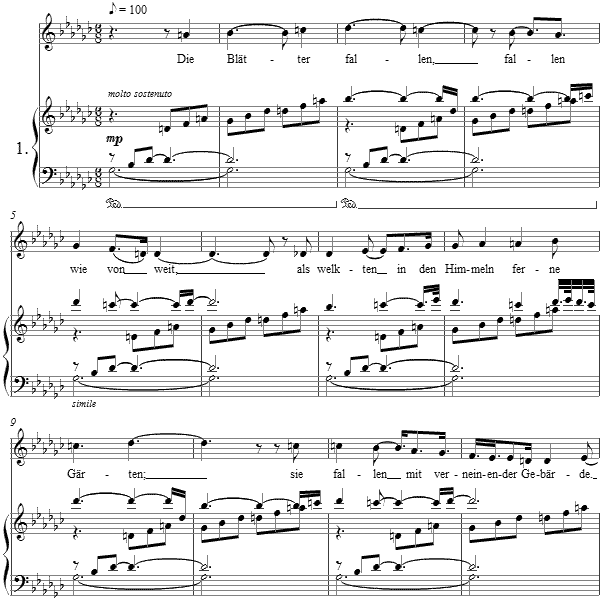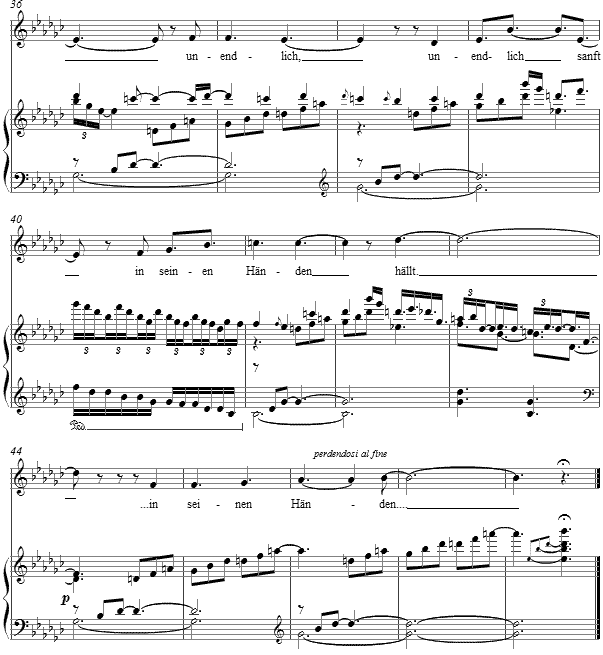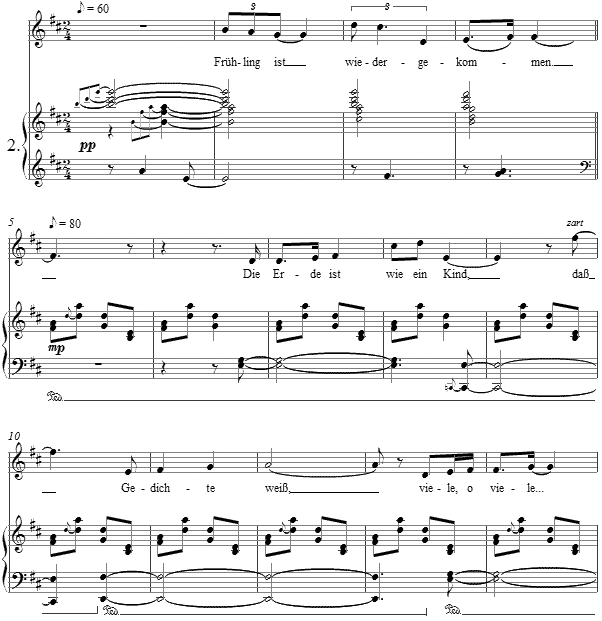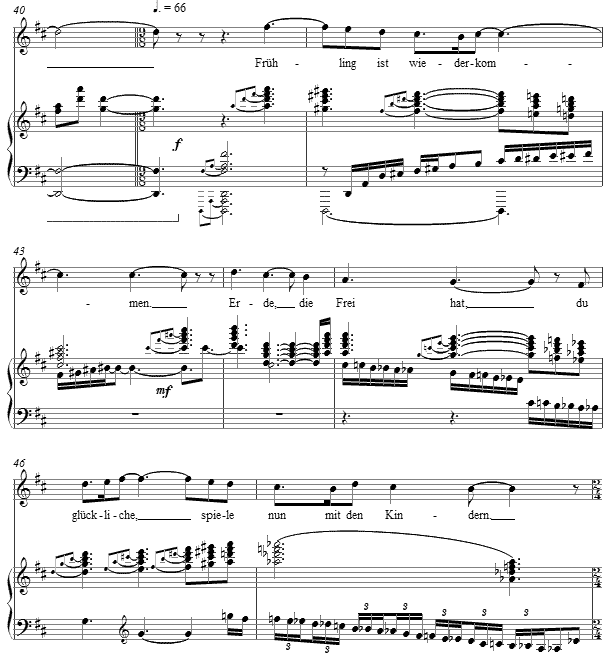Music and Texts of GARY BACHLUND
Vocal Music | Piano | Organ | Chamber Music | Orchestral | Articles and Commentary | Poems and Stories | Miscellany | FAQs
Zwei Rilke-lieder - (2008)
Rainer Maria Rilke
for mezzo soprano and piano
Petra Lang gewidmet
i. Herbst - [ 3 pages, circa 2' 55" ]
Die Blätter fallen, fallen wie von weit,
als welkten in den Himmeln ferne Gärten;
sie fallen mit verneinender Gebärde.
Und in den Nächten fällt die schwere Erde
aus allen Sternen in die Einsamkeit.
Wir alle fallen. Diese Hand da fällt.
Und sieh dir andre an: es ist in allen.
Und doch ist Einer, welcher dieses Fallen
unendlich sanft in seinen Händen hält.
ii. Frühling - [ 6 pages, circa 4' 20" ]
Frühling ist wiedergekommen. Die Erde
ist wie ein Kind, daß Gedichte weiß,
viele, o viele . . . . Für die Beschwerde
langen Lernens bekommt sie den Preis.
Streng war ihr Lehrer. Wir mochten das Weiße
an dem Barte des alten Manns.
Nun, wie das Grüne, das Blaue heiße,
dürfen wir fragen: sie kanns, sie kanns!
Erde, die Frei hat, du glückliche, spiele
nun mit den Kindern. Wir wollen dich fangen,
fröhliche Erde. Dem Frohsten gelingts.
O, was der Lehrer sie lehrte, das Viele,
und was gedruckt steht in Wurzeln und langen
schwierigen Stämmen: sie singts, singts![ 9 pages, circa 7' 15" ]
Rainer Maria Rilke
i. Fall
The leaves are falling, falling as from afar,
as distant gardens wither in heaven;
falling with gestures of denial.
And in the nights falls the heavy earth,
out from the stars into loneliness.
We all are falling. This hand also falls.
And notice the other as well: it is everywhere.
And still there is One holding this falling
with unending tenderness in his hands.
ii. Spring
Spring is again returned. The Earth
is like a child, that knows poems,
many, o many . . . . For the rigor
of such long learning she receives the prize.
Strict was her teacher. We appreciate the white
in the old man's beard.
Now, what to name green, or blue,
we may ask: she knows, she knows!
Earth, now free, you happy one, play
now with the children. We want to catch you,
joyful Earth. Only the joyful are able.
O, what the teacher taught her, such plenteousness,
and that which is pressed in roots and long
heavy trunks: she sings, she sings!
(in Sonnets to Orpheus, XXI)
The opening setting pits G-flat major against and with D minor, into a repetitive gesture over which an arching line sings, one for the voice and one in the piano. A continued blurring of the sonority with the pedal carries both harmonies into one.
As the gentle brilliance of the falling leaves matches the serenity of being held in the hand of God, the second strophe takes up an octave higher than the first.
G flat mingling with D minor lingers, a final chord emphasizing this tonic which then becomes both leading tone to the following G major and third of the D major which evolves with "Spring." As with the setting of "Autumn," the blurring of the pedal marries two potential tonal regions into one "Klang." A counterpoint of C enters beneath the new harmonic gesture above.
The 2/4 breaks into a joyous 9/8 with the poem's first line, placed later in this particular setting, and parallel majors triads sing out above a chromatic line beneath, as for this moment a clear statement of D major washes away the embedded subdominant G.
Petra Lang
Born in Frankfurt, Petra Lang began her music studies with the violin before studying voice with Gertie Charlent at the Music Academy of Darmstadt. Her awards include first place in the s'Hertogenbosch, Robert-Stolz and Girardi International Singing Competitions. She is much in demand for her Wagnerian roles of Kundry, Sieglinde, Brangäne, Venus, Ortrud; Adriano, Bartoks Judith, Berlioz Cassandre and for her interpretation of Gustav Mahlers’ works, and has appeared in all the major opera houses in Europe and the US, major orchestras worldwide, and has worked with the leading conductors including Abbado, Boulez, Bychkov, Chailly, Chung, Davis, Haitink, Harding, Inbal, Janowski, Jordan, Metha, Muti, Saraste, Sawallisch, Rattle, Runnicles, Tate, Thielemann.
Petra Lang enjoys a reputation as being a sensitive lieder interpreter; and has given recitals in Londons’ Wigmore Hall, Amsterdams’ Concertgebouw, Paris' Théâtre du Châtelet and Louvre, Austria's Schubertiade Feldkirch, Edinburgh Festival, New York's Carnegie Hall, Geneva, Brussels, Gent and throughout her native Germany. She has recorded songs composed by the conductor Clemens Krauss for Oehms Classics.
We had met in Braunschweig years before during a run of Tristan und Isolde, and then again in New York. Getting reacquainted this year while working together in a concert of the second act of Parsifal after many intervening years, I thought to compose something specifically for her, so much do I admire her work and art.
The score for Zwei Rilke-lieder is available as a free PDF download, though any major commercial performance or recording of the work is prohibited without prior arrangement with the composer. Click on the graphic below for this piano-vocal score.





